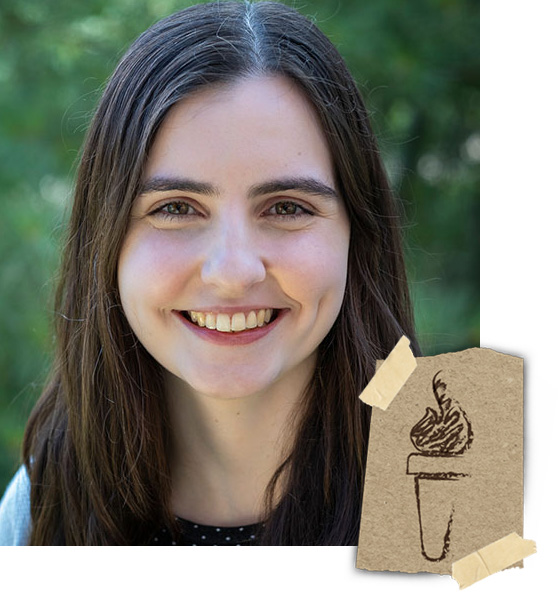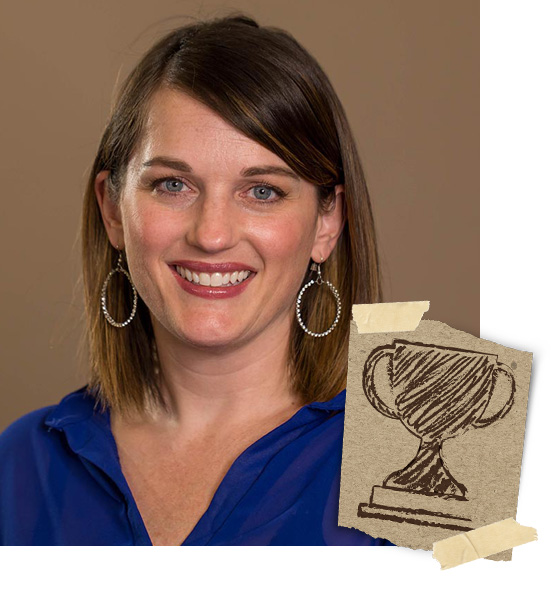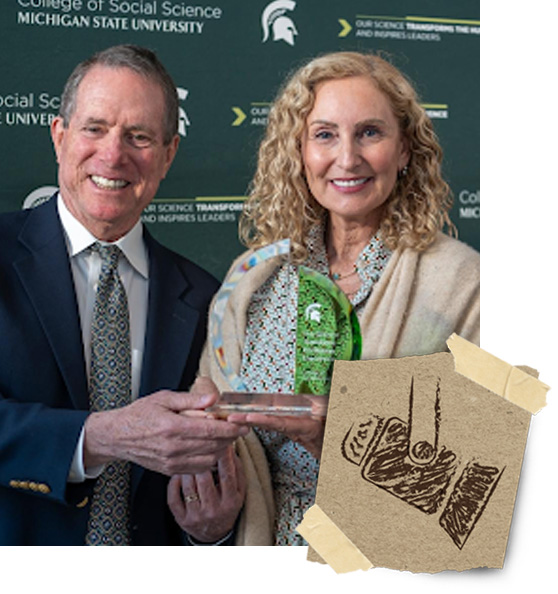Access Torch: Jessica Tschida
October 7, 2025 - Emily Jodway
 Jessica Tschida, a fifth-year PhD student in the Clinical Science research area in MSU’s Department of Psychology, is our Access Torch during the month of October, as we recognize World Mental Health Day on October 10 and the importance of mental health care practices and access for all.
Jessica Tschida, a fifth-year PhD student in the Clinical Science research area in MSU’s Department of Psychology, is our Access Torch during the month of October, as we recognize World Mental Health Day on October 10 and the importance of mental health care practices and access for all.
Tschida grew up in a rural, underserved community and saw firsthand the struggles that community members faced accessing mental health care and other services. This in part inspired her to study psychology and community-engaged research. During her time in undergrad at Barnard College, she took a course specifically looking at mental health interventions for individuals with developmental disabilities, and worked closely with adolescents and young adults on the spectrum through volunteer work.
These experiences stuck with her, and she joined the Children’s Hospital of Philadelphia’s (CHOP) Center for Autism Research as a research assistant before arriving at Michigan State to earn her master’s and eventual PhD in Clinical Science. During her graduate school search, she was drawn to MSU and the Department of Psychology because, as she explains, “The research that was being conducted in my advisor’s lab specifically integrates that community engagement and implementation science approach with the population that I was really interested in, children and adolescents on the spectrum and their families.”
Tschida’s current research centers around working with the community to effectively respond to their priorities and needs and better tailor the services and practices individuals like herself are developing in research labs. Most importantly, she says, is taking time during this process to listen to the needs of those on the margins of these communities and who may have been historically underserved, systemically excluded, or mistreated by researchers in the past.
“I feel very passionately about making sure that when we are developing interventions that are intended for community use, we are actually stopping to ask community members what they think and to learn from their lived experiences and expertise, which oftentimes can be quite different from what we might know as researchers or as people.”
To Tschida, research isn’t complete without these important elements. Putting a focus on getting input directly from the community about what’s most important to them in the services they receive and the questions that researchers ask and attempt to answer is known as a community-engaged approach. Oftentimes, she explains, this can increase the social validity of the practices being put in place by researchers and clinicians. “It’s important to have this sense of cultural humility and to listen to what communities are really reporting that they need or that they want.”
This methodology is what guided Tschida through her dissertation work. Her project aimed to adapt a specific type of therapy for autistic youth with co-occurring anxiety. She specifically asked members of the autistic community how this therapy, which was developed in a laboratory setting, might need to be adjusted to better meet the needs of clients and providers. Throughout the project, she met with a community advisory board to decide things like how to recruit participants, how to best present findings and information to them, and how the results could be relayed back to the community. She took extra care to ensure those voices from the most vulnerable parts of the community were included on the board and in the participant group.
Tschida found that there was a marked improvement in how the community providers perceived the therapy once it incorporated community-engaged adaptations through use of a community-engaged approach. “That’s helpful to hear, because we want community providers to be able to actually use and implement these evidence-based practices that we’re developing,” she explained. “It doesn’t do much good if we develop these practices in research laboratories, and they look really great on our randomized control trials, but then no one in the community is actually using them.”
During her time at Michigan State, Tschida has learned to lean on her fellow graduate students both in and outside of her graduate program for support and encouragement. She has also continued to hone her skills surrounding community-engaged research, taking part in MSU’s Graduate Certification in Community Engagement program. Community-engaged research should be mutually beneficial, Tschida explains, and it’s an additional benefit to forge that relationship with institutional support. “It’s not just a relationship where researchers are coming in and getting data from these community members. Instead, researchers and students are coming in and actually helping these individuals with their own community-driven, community-led initiatives.”
While working in the realm of mental health care and interventions, Tschida also makes sure to set aside time to care for her own mental health. She enjoys engaging in meaningful volunteer work, connecting with her community, spending time with family and friends, and going to the gym for a stress-relieving workout. “People each have their own thing that works for them, sometimes it’s just finding out what that is, and then finding out how to consistently implement and prioritize that,” she says.
She also is a strong advocate for improving access to mental health services for everyone. Listening to the community and its needs, offering further training for health professionals to deliver practices important to mental health, and mobilizing mental health providers in community hubs like libraries and community centers are all important steps toward increasing access, says Tschida.
“It really should start with listening to the community and what they see as the needs and priorities for improving mental health care,” she added. “Oftentimes these are the people that are trying to navigate the system, sometimes successfully and sometimes unsuccessfully, because of the way our current system is set up.”
Honorees’ views are their own and do not necessarily reflect those of the College of Social Science.
Read more:

Access Champion
Faculty/Staff
Nicki Moody
Nicki Moody is a BASW Field Coordinator, mental health clinician, and community advocate with 20+ years in social work and 12 as a licensed therapist. She is dedicated to addressing the impact of untreated mental health conditions in communities facing poverty, racism, and limited access to care.

Access Spotlight
Alumni
Mark and Barbara Gerson
The Gersons founded the Gerson Mental Health Initiative within SSC Social Science Scholars Program. The initiative gives students access to mental health care, psychoeducation, and stress-management classes, offering both prevention and intervention supports.

Access Matters
We strive to cultivate an inclusive and welcoming college environment that celebrates a diversity of people, ideas, and perspectives.

